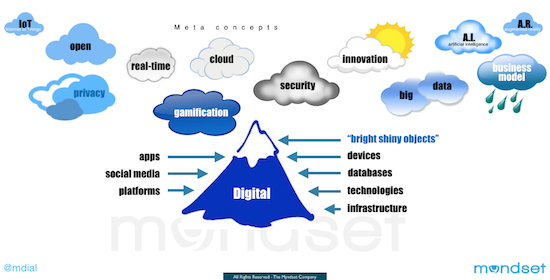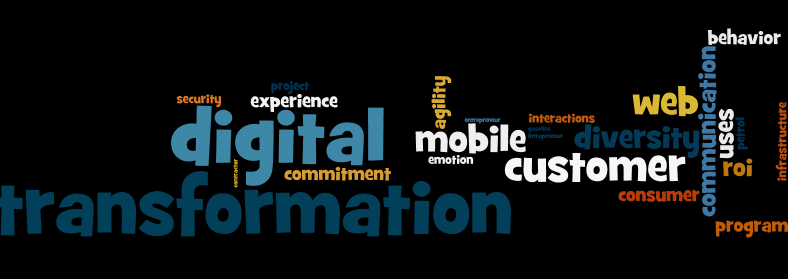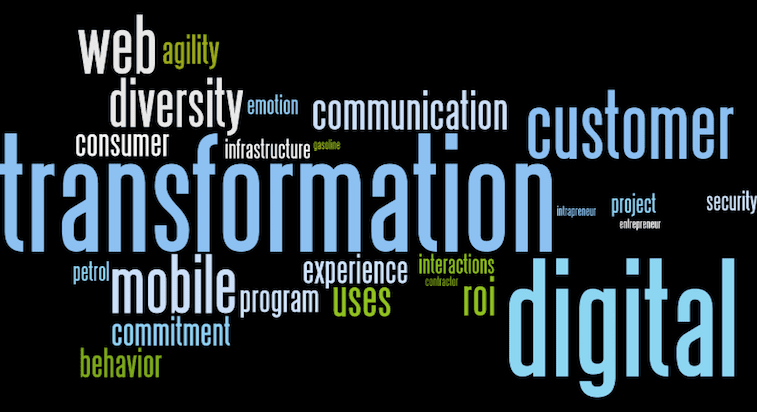Everywhere you look, companies are knee-deep in some form of digital transformation program. To the extent the subject is high up on the ExCom’s list of priorities, the most likely conclusion is that the company feels that they are late to the game. The biggest issue for the executive team is that digital transformation is much more than the selection of a new IT system or new software platform (e.g. CRM). Above all, it’s a question of mindset. In an article I wrote for CMO.com, I spoke of the need to tackle the “digital mountain;” the scale of the task can certainly be difficult to grasp.

As challenging and overwhelming as it may seem, each business is obliged to understand the implications and opportunities that lie within, or else a fleeter footed entrepreneur will take advantage. There are 3 principles that are profoundly disturbed by the existence of this digital mountain:
- speed — to act and communicate
- the client relationship
- the business model.
Why doesn’t my digital transformation program go faster?
It’s a question I hear frequently, especially behind closed doors.

Here is the list of reasons that I believe underly the lack of success of digital transformation programs in big business. They’re not in any particular order, except that the first three are generally rather fatal.
- The Business lacks a true “North.” That’s to say, the business doesn't have a precise and shared mission that unites the stakeholders, gives the company a sense of purpose and a compass by which to navigate the turbulent times Share on X
- The boss isn’t digital. He/she considers it sufficient to read about digital news and analyses in the WSJ and Forbes, or to absorb the reams of consultants’ reports, than to be digital him or herself. Another variation on this theme: the boss doesn’t believe that digital will materially impact his reign (e.g. before moving on).
- Not customer-centric. The business has a culture that is incompatible with the concept that “the customer is king.” For example, the culture is more excited by its own product, or spends an inordinate amount of time on internal politics and leadership struggles. Being truly customer-centric is no easy feat, but in today’s connected world, there is no doubt that the customer has more power than before.
- Employee Dis-Engagement. With the mobilization required by the transformation of so many facets of the business, the winners will be those with the most committed and engaged managers and employees. Moreover, with the heightened power in the hands of the customer, the number of points of contact has increased, meaning that there are more opportunities for employees to interface with customers (off and online). Thus, the risk of slipping because of a lack of employee engagement is greater.
- Time management is off kilter. Traditional time management techniques have been overwhelmed by the avalanche of new communication methods. Layers of hierarchy and silos make time management even harder. Share on X Without a True North setting, executives struggle to manage their rarest resource: time. And, when the senior team isn’t switched on digitally (see #2 above), the issues and backlogs accumulate. Agility requires rapid decision-making. Being informed on time, in real-time, with the right data is a key issue. Share on X
- Internal communications are poor. Since top management sets the tone, poor internal communications are generally a direct result of a non-digital senior team. As a result, voicemail, email, SMS messages pile up; firewalls have remained too restrictive because of over-prudence and/or being out of comfort zone; new tools such as Dropbox, Doodle, Google Drive, Skype, Facebook are sadly not available on work-paid devices and terminals.
- Out-dated legacy systems. Whether it’s the IT infrastructure or a layer of analogue top & middle managers, the business suffers from its own heritage. Not that a new IT system will work without significant culture changes, but clawing to the old system (e.g. which has not been fully amortized) will only dilute efforts.
- All Hail: The Ideas. Some very intelligent leaders pay more attention to great ideas. They consider ideas noble. Worse, they venerate and search for perfection. As a result, action, learning and potentially pivoting takes too long.
- The mindset just isn’t adapted. Concepts such as transparency, authenticity, empathy and failure are antithetical with the company culture (and most notably among members of the Board).
Many a CEO has been tempted to nominate a Chief Digital Officer, to head the digital transformation program, as if the transformation of one’s mindset could be delegated? Finding one’s path up the digital mountain demands a lot of energy, in the best of cases — even when the mindset is willing. But, when on top of it there is short-term pressure on results, digital transformation will inevitably remain slow as molasses.
Which reasons resonate with you? Have I missed any other reasons? Happy to hear your thoughts!











